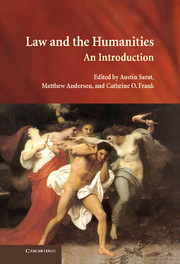Book contents
- Frontmatter
- Contents
- Contributors
- Acknowledgments
- Introduction: On the Origins and Prospects of the Humanistic Study of Law
- I PERSPECTIVES ON THE HISTORY AND SIGNIFICANCE OF SCHOLARSHIP IN LAW AND THE HUMANITIES: THREE VIEWS
- II IDEAS OF JUSTICE
- III IMAGINING THE LAW
- IV LINGUISTIC, LITERARY, AND CULTURAL PROCESSES IN LAW
- 12 Language
- 13 Interpretation
- 14 Narrative and Rhetoric
- 15 Justice as Translation
- 16 The Constitution of History and Memory
- V INSTITUTIONAL PROCESSES
- Index
- References
16 - The Constitution of History and Memory
Published online by Cambridge University Press: 20 January 2010
- Frontmatter
- Contents
- Contributors
- Acknowledgments
- Introduction: On the Origins and Prospects of the Humanistic Study of Law
- I PERSPECTIVES ON THE HISTORY AND SIGNIFICANCE OF SCHOLARSHIP IN LAW AND THE HUMANITIES: THREE VIEWS
- II IDEAS OF JUSTICE
- III IMAGINING THE LAW
- IV LINGUISTIC, LITERARY, AND CULTURAL PROCESSES IN LAW
- 12 Language
- 13 Interpretation
- 14 Narrative and Rhetoric
- 15 Justice as Translation
- 16 The Constitution of History and Memory
- V INSTITUTIONAL PROCESSES
- Index
- References
Summary
Almost twenty years ago, the historian Pierre Nora wrote about the growing number of “lieux de mémoire” – museums, monuments, and memorials – where postmodern society situates public remembrance of traumatic or triumphant events. Yet he devoted little sustained attention to what may be the quintessential lieu de mémoire today, the courtroom or truth commission hearing room. Traces of our contemporary obsession with the encounter among law, history, and memory are everywhere. It is a rich bonanza for lawyers: writing new constitutions for new republics, staffing international tribunals for war criminals, and taking testimonies for truth commissions. Much of the enthusiasm for legal strategies to “come to terms with” the past draws on individual psychoanalytic metaphors for collective traumas, and relatively simplistic theories of historical practice, law, and narrative – whether that personal narrative will humanize law, or that justice will be secured by the search for historical truth.
This chapter will discuss efforts by scholars of law and the humanities to address law's relationship to history and collective memory, often through the lens of psychoanalytic or literary theory. This work began with a focus on trials of war criminals, especially Holocaust perpetrators, and has developed to consider alternative political and legal mechanisms to address a shameful past, such as truth commissions, apologies, and reparations, with growing attention to the aftermath of apartheid in South Africa, as well as the legacy of slavery and the slave trade in the United States, Europe, and Africa.
- Type
- Chapter
- Information
- Law and the HumanitiesAn Introduction, pp. 416 - 452Publisher: Cambridge University PressPrint publication year: 2009



